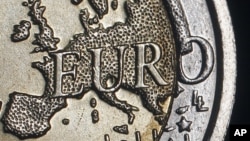The European Union says that economic growth in the 17-nation euro currency bloc stalled in the early months this year.
Earlier projections in recent weeks signaled that the eurozone had fallen into a recession in the January-to-March period this year, after contracting three-tenths of a percent in the last three months of 2011. But the region's economic powerhouse, Germany, unexpectedly advanced by half a percentage point in the first quarter, enough to lift the rest of the currency union's economy to a stagnant level.
But the economic performance was much less robust elsewhere in the eurozone. The region's second biggest economy, in France, was flat. Italy, with the third biggest, fell eight-tenths of a percent, while No. 4 Spain dropped three-tenths.
Greece, facing massive debts and now a new election after being unable to form a coalition government, is in its fifth year of a recession. Its quarterly performance was not available.
Most European governments have imposed unpopular spending cuts in an effort to cut burgeoning deficits. But the austerity measures have curbed economic growth.
With a separate currency, Britain is not part of the eurozone. But British Chancellor of the Exchequer George Osbourne, in Brussels for a meeting of European finance chiefs, says the sluggish economy in the currency bloc hurts the entire continent.
"This is a time of considerable uncertainty in the Eurozone economies and that uncertainty is undermining the entire European recovery. And I think we are reaching a point where we've got to make a decision, we have got to see the Eurozone stand behind their currency, a very important part of that, of course, is strengthening the entire European banking system and that is what we intend to do today," he said.
The flat economic growth and the political uncertainty in Greece have diminished the value of the euro. It dipped below $1.28 in value on Tuesday, its lowest point in nearly four months.
Earlier projections in recent weeks signaled that the eurozone had fallen into a recession in the January-to-March period this year, after contracting three-tenths of a percent in the last three months of 2011. But the region's economic powerhouse, Germany, unexpectedly advanced by half a percentage point in the first quarter, enough to lift the rest of the currency union's economy to a stagnant level.
But the economic performance was much less robust elsewhere in the eurozone. The region's second biggest economy, in France, was flat. Italy, with the third biggest, fell eight-tenths of a percent, while No. 4 Spain dropped three-tenths.
Greece, facing massive debts and now a new election after being unable to form a coalition government, is in its fifth year of a recession. Its quarterly performance was not available.
Most European governments have imposed unpopular spending cuts in an effort to cut burgeoning deficits. But the austerity measures have curbed economic growth.
With a separate currency, Britain is not part of the eurozone. But British Chancellor of the Exchequer George Osbourne, in Brussels for a meeting of European finance chiefs, says the sluggish economy in the currency bloc hurts the entire continent.
"This is a time of considerable uncertainty in the Eurozone economies and that uncertainty is undermining the entire European recovery. And I think we are reaching a point where we've got to make a decision, we have got to see the Eurozone stand behind their currency, a very important part of that, of course, is strengthening the entire European banking system and that is what we intend to do today," he said.
The flat economic growth and the political uncertainty in Greece have diminished the value of the euro. It dipped below $1.28 in value on Tuesday, its lowest point in nearly four months.





